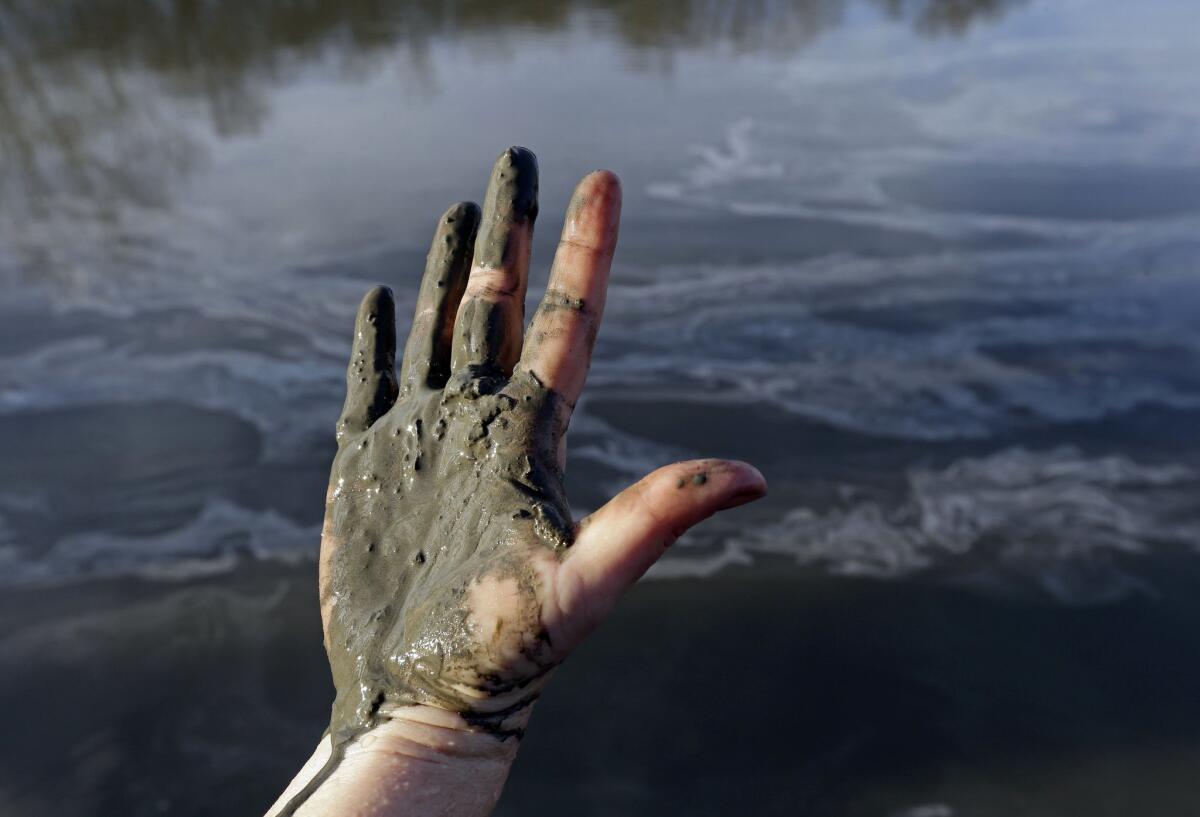Duke Energy fined $102 million for polluting rivers with coal ash

In this Feb. 5, 2014, photo, Amy Adams, North Carolina campaign coordinator with Appalachian Voices, shows wet coal ash from the Dan River in Danville, Va. On Thursday, Duke Energy pleaded guilty to polluting rivers with spills of coal ash.
- Share via
Reporting from Greenville, N.C. — Duke Energy, the nation’s largest electrical utility, pleaded guilty in federal court Thursday to nine criminal violations of the Clean Water Act for polluting four major rivers for several years with toxic coal ash from five power plants in North Carolina.
The $50.5-billion company was fined $102 million and placed on five years of probation for environmental crimes. All company compliance related to coal ash in five states will be overseen by a court-appointed monitor and reported to federal parole officers.
U.S. District Judge Malcolm J. Howard approved the plea agreement Thursday morning following a 90-minute court session in which a Duke Energy lawyer repeated the words “guilty, your honor” more than 20 times.
The nine misdemeanor charges were filed against three Duke Energy subsidiaries, and the lawyer responded for each charge against each subsidiary. Howard found the utility guilty on all nine counts.
“Today we said big corporations are not above the law, and polluters who harm our environment will be held accountable,” U.S. Atty. Thomas Walker of the Eastern District of North Carolina said outside the federal courthouse.
Though the plea deal ended the federal criminal case against Duke, a senior Environmental Protection Agency official who attended the hearing, Cynthia Giles, said ongoing investigations of Duke’s handling of coal ash could still result in civil enforcement actions.
“Companies that cut corners and contaminate waters on which communities depend, as Duke did here, will be held accountable,” said Giles, the EPA’s assistant administrator for enforcement and compliance assurance.
Environmentalists have complained for years that Duke has polluted waterways and groundwater with coal ash, and the company faces several civil lawsuits filed by environmental groups.
But coal ash pollution did not come to widespread public attention until February 2014, when a spill at a Duke coal ash lagoon dumped 39,000 tons of coal ash, and 27 million gallons of ash slurry coated the Dan River with thick sludge for 70 miles.
A federal criminal indictment said Duke “did fail to exercise the degree of care that someone of ordinary prudence would have exercised in the same circumstance with respect to the discharge of coal ash and coal ash wastewater.” The utility was charged with the “criminally negligent discharge of pollutants” and failure to maintain coal ash treatment equipment.
Four of the nine charges involved illegal discharges at the Dan River plant. Duke also pleaded guilty to coal ash discharge violations at power plants near Charlotte, Asheville, Goldsboro and in Chatham County in central North Carolina.
Duke will pay $68.2 million in fines and restitution and $34 million for community service and mitigation projects. The utility has said the money will come from shareholders, not customers.
The judge also ordered Duke to run full-page newspaper ads of apology in two national and three North Carolina newspapers.
For years, prosecutors said, Duke officials ignored warnings by its employees and contractors about a pipe that eventually ruptured and caused the Dan River spill. They rejected proposals that the company spend $20,000 for video inspections of four pipes, including the one that ruptured.
Assistant Atty. Gen. John C. Cruden, who attended the hearing, said the Dan River spill “was a crime, and it was the result of repeated failures by Duke Energy’s subsidiaries to exercise control over coal ash facilities.”
“Duke apologized for their actions — and they should have. And they should have listened to their own employees,” he said.
Only after the spill did Duke began making serious attempts to control leaks from its coal ash dumps on the Dan River and elsewhere in the state, a federal prosecutor told the judge. “It took the third-largest coal ash spill in U.S. history … to motivate that change,” Assistant U.S. Atty. Banumathi Rangarajan told the court.
Duke officials noted that Chief Executive Lynn Good had apologized for the spill and promised to “make things right.”
“That’s what we have done today,” Jim Cooney, a lawyer for Duke, told the judge during a 45-minute presentation that included a slide show. He said Duke’s failure to use video to inspect the Dan River pipe was part of “a series of independent errors over a long period of time’’ by the utility’s managers and employees.
Good, in a statement Thursday, said, “We are setting a new standard for coal ash management and implementing smart, sustainable solutions for all of our ash basins.’’
In court, Cooney reminded the judge that the EPA announced in July that water in the Dan River had been restored to pre-spill quality. Duke says it has spent $20 million cleaning up the river.
Duke will pay $24 million to the National Fish and Wildlife Foundation to protect ecosystems in North Carolina and Virginia, where the Dan River spill also affected residents. An additional $10 million will go for mitigation efforts in wetlands in areas affected by coal ash dumps.
Known as “coal combustion residuals,” coal ash is the residue left after coal is burned to produce electricity. It is typically stored in unlined ponds or pits next to waterways. Coal ash slurry contains toxic arsenic, lead, mercury and heavy metals that can contaminate groundwater, streams and rivers while also polluting the air.
The Dan River spill focused public and political attention on Duke’s 130 million tons of coal ash stored at 32 North Carolina sites, which environmentalists say have been polluting rivers, streams and groundwater with toxic ash for years.
State legislators responded to the spill by requiring Duke to clean up and safely store the ash in lined, dry pits that are monitored for leaks. The four coal ash ponds with the worst leaks must be cleaned up by 2019, and the rest by 2029. The legislation also requires testing of private wells near ash ponds.
In addition to lawsuits filed by environmental groups, Duke faces four coal ash lawsuits filed by state regulators. Those suits have cited groundwater contamination and illegal seepage from earthen dams surrounding the coal ash ponds, also called lagoons. In December, Duke reported about 200 seeps that released up to 3 million gallons a day from the ponds into nearby rivers and lakes.
Some of the most serious pollution has come at Duke’s H.F. Lee plant in Goldsboro, about 50 miles southeast of Raleigh, where concentrations of arsenic in groundwater were recorded at more than 60 times the maximum safe level for drinking water. High concentrations of arsenic can cause some cancers.
Duke was charged with failing to maintain treatment system equipment at the Dan River and at the Chatham County plant. In March, state environmental regulators cited Duke for pumping 61 million gallons from ash ponds into a stream near the Chatham County plant.
In court Thursday, federal prosecutors rattled off a long list of toxic heavy metals contained in coal ash, including arsenic, selenium, chromium and mercury. Howard asked a prosecutor to slow down and repeat the compounds, saying, “Tell me what those bad things were again.”
Environmentalists said the plea deal does not require Duke to stop the 200 seeps of coal ash it has acknowledged at power plant sites around the state. The seeps release 3 million gallons of coal ash water a day, much of it ending up in rivers and streams.
“These fines do not clean up that mess,’’ said John Suttles of the Southern Environmental Law Center, which has sued the utility over coal ash.
Over a nine-day period, Suttles said, the amount released by the 200 seeps would equal the amount of coal ash released during the Dan River spill.
Pete Harrison, an attorney with Waterkeeper Alliance, a national environmental group, said Duke “is trying to legalize those leaks.”
A team of at least 18 federal lawyers and investigative agents, including an official from the U.S. Justice Department’s environmental crimes section, faced off in court against five Duke Energy lawyers backed by a team of corporate public relations experts.
A federal grand jury investigated the relationship between Duke Energy and state environmental regulators, who have been accused by environmental groups of failing to adequately police Duke. Federal subpoenas issued to Duke and the state Department of Environment and Natural Resources requested records of any payments or “items of value.”
Walker, the U.S. attorney, last year described the federal inquiry as a “criminal investigation of a suspected felony.”
Nationally, the EPA says it has documented 160 cases of air and water contamination from coal ash ponds, with 140 million tons of ash generated each year.
In December, the EPA issued the first regulations covering the storage and disposal of coal ash. But environmental groups complained that the regulations do not treat coal ash as hazardous waste, but more like household garbage.
For national news follow @davidzucchino on Twitter
More to Read
Sign up for Essential California
The most important California stories and recommendations in your inbox every morning.
You may occasionally receive promotional content from the Los Angeles Times.











